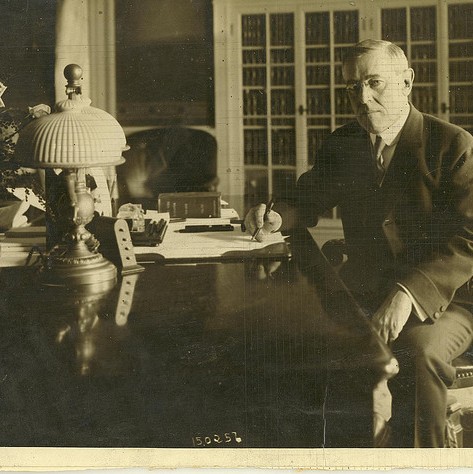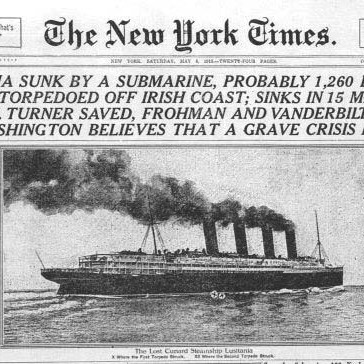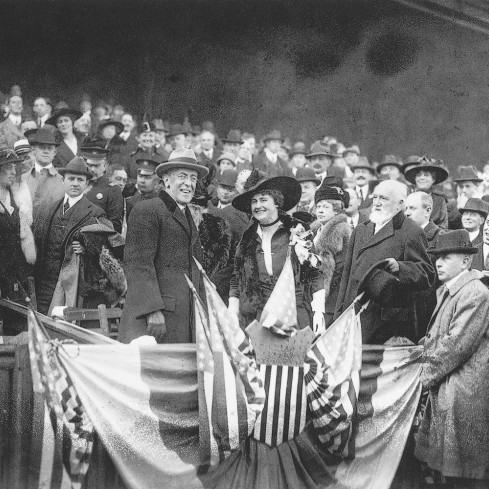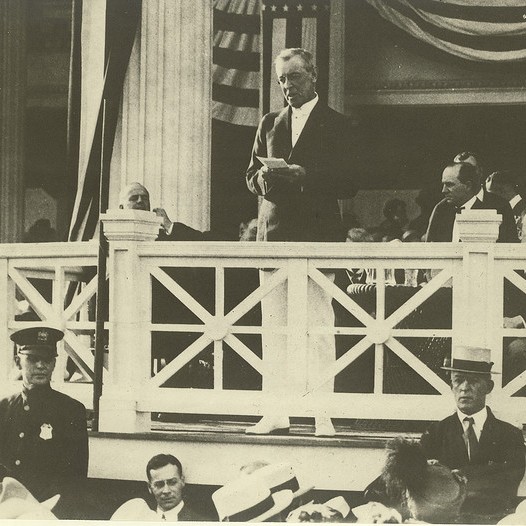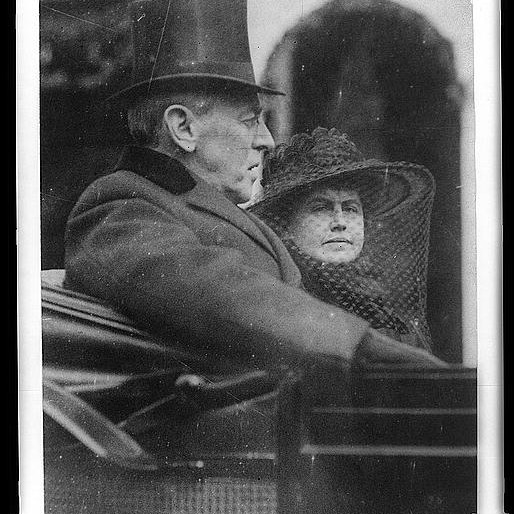A President Speaks Out on Immigration
In an address to new citizens, Woodrow Wilson spoke of the American dream
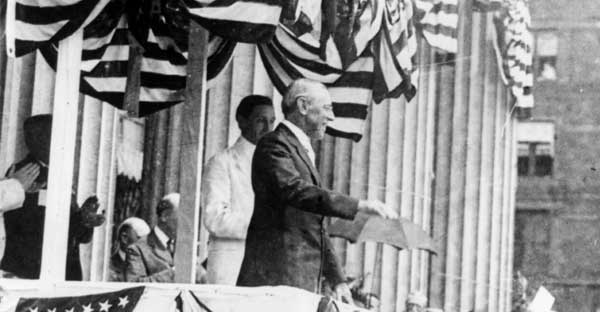
Humanity can be welded together only by love, by sympathy, by justice, not by jealousy and hatred. I am sorry for the man who seeks to make personal capital out of the passions of his fellow-men. He has lost the touch and ideal of America, for America was created to unite mankind by those passions which lift, and not by the passions which separate and debase. … It was but an historical accident, no doubt, that this great country was called the “United States”; yet I am very thankful that it has that word “United” in its title, and the man who seeks to divide man from man, group from group, interest from interest in this great Union is striking at its very heart. …
No doubt you have been disappointed in some of us. Some of us are very disappointing. No doubt you have found that justice in the United States goes only with a pure heart and a right purpose, as it does everywhere else in the world. No doubt what you have found here did not seem touched for you, after all, with the complete beauty of the ideal which you had conceived beforehand. But remember this: If we had grown at all poor in the ideal, you brought some of it with you. … And if some of us have forgotten what America believed in, you, at any rate, imported in your own hearts a renewal of the belief. That is the reason that I, for one, make you welcome. … You dreamed dreams of what America was to be, and I hope you brought the dreams with you. No man that does not see visions will ever realize any high hope or undertake any high enterprise. Just because you brought dreams with you, America is more likely to realize dreams such as you brought. You are enriching us if you came expecting us to be better than we are.
—Woodrow Wilson, to 4,000 newly naturalized citizens
Philadelphia, May 10, 1915
Backstory:
Woodrow Wilson is remembered as a progressive for his economic reforms, not his policies on race and gender. Born in the South just before the Civil War, he was, like most of his white male contemporaries, a throwback on questions of social equality. He was slow to drop his opposition to the movement for a constitutional amendment giving American women the right to vote. In the country’s long march toward racial equality, the Wilson administration took a giant step backward by segregating the civil service, where blacks and whites had long been working side by side. And years earlier, when he was a historian teaching at Princeton, Wilson had written disparagingly of immigrants from Eastern and Southern Europe.
Many of Wilson’s social prejudices remained intact, but over time he became more open-minded about immigration. Although his conversion was less spiritual than political—as a presidential candidate he needed immigrant votes—the change did call forth finer feelings. He genuinely believed that if immigrants saw themselves as fully American, the United States would be free of the ethnic conflicts that caused so much strife in the Old World.
President Wilson always spoke from the heart when he spoke of American ideals, and few presidents have sounded the high notes as easily and naturally as he did. But he was not at all at ease when he went to Philadelphia in May 1915. The whole of Europe and much of the Middle East was at war. Three days before the speech, 128 Americans (along with 1,073 others) were killed when the British ocean liner Lusitania was struck by a torpedo from a German submarine. The event shocked the world, and in the United States the shock registered with the same force that later generations felt when they heard about the attacks on Pearl Harbor and the World Trade Center.
The speech in Philadelphia was Wilson’s first since the Lusitania, and Edmund Starling, a Secret Service agent sitting behind him onstage, could see that the president had the jitters. This was strange. Wilson loved giving speeches, and his self-control verged on the superhuman. But there he was, squirming and fidgety. Hardly able to stand still. Rocking back and forth on his heels. Helpless as his hands darted from lapel to pocket to midriff. Wilson settled down when he realized that the crowd was with him, applauding just where he would have them applaud. Or so it seemed to Starling, who would remember him standing “firm and still, with his hands behind him. The left hand held the right, and the third finger of the right hand tapped out the rhythm of the speech on the thumb, striking, just as his voice struck, on the key word of each sentence.”
What happened next suggests that Wilson was still unnerved. The sinking of the Lusitania brought the United States to the brink of war, a calamity that Wilson hoped to avoid. When he went to Philadelphia, he was still pondering his options and had no intention of baring his half-formed thoughts to an audience. But as he neared the end of his speech, he heard himself say, “There is such a thing as a man being too proud to fight. There is such a thing as a nation being so right that it does not need to convince others by force that it is right.” “Too Proud to Fight” appeared in headlines across the country, and the country understood him to mean that he would take the Kaiser’s blow lying down.
Wilson instantly wanted to kick himself for the remark, and when Senator Henry Fountain Ashurst, Democrat of Arizona, read it in the newspapers, he thought he knew what had happened: Wilson was tired. True. Ashurst was certain that the president had meant to say “too proud to be vindictive,” a phrase from Byron’s “Lament of Tasso.” Quite possibly true, as Wilson knew reams of Romantic poetry by heart. (A curious footnote to this curious footnote: Oswald Garrison Villard, an ardent pacifist and the publisher of The Nation and the New York Evening Post, boasted that he had suggested “too proud to fight” to Wilson’s secretary.)
At a White House press conference the next day, a reporter asked if the speech had been a declaration of foreign policy, and Wilson calmly denied it. “I was thinking wholly of the people I was addressing, and of the Cain some people have been trying to raise,” he said.
But “too proud to fight” stuck, while the most inspired passage of Wilson’s speech to those new citizens—on the great gift that newcomers bring to the United States—was forgotten. It deserves a better fate, especially in light of the Cain some people have been raising about immigration lately.
To hear Woodrow Wilson’s speaking voice, click here.

